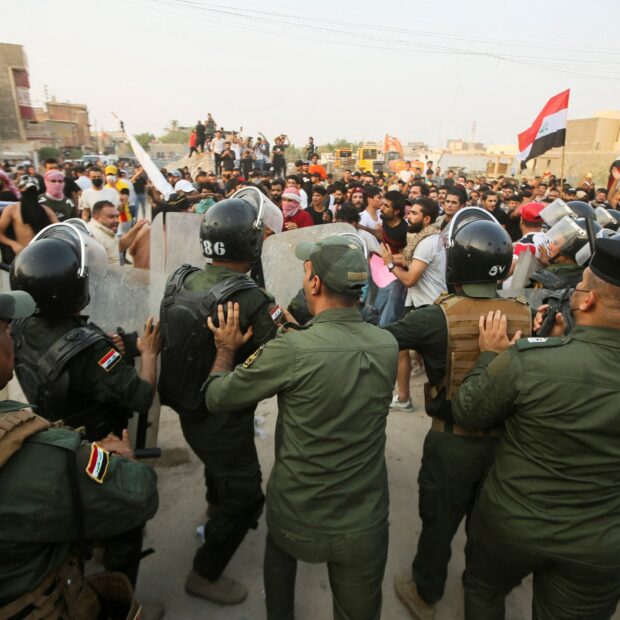
The Sadrist Movement’s Sit-In Sends Iraq into Political Turmoil
By Omar Al-Shommari – WHIA Iraq Office
It seems that the Iraqi political crisis is escalating, following the melting point of a thin sheet of ice over a daunting political conflict between the Sadrist movement and the forces of the Irani-backed coordination framework, which threw the possibility of reaching a settlement between the two powers out the window.
After a series of destructive events in Iraq, including the parliamentary elections last October, represented by a major disagreement over the new system to form the ministry, the political estrangement has increased drastically with relations becoming more and more desperate.
The Judiciary Sit-in
On the morning of Tuesday, August 23, 2022, hundreds of al-Sadr’s supporters surprised Iraqis with a gathering in front of the Supreme Judicial Council in the Green Zone, to demand the resignation of the council’s president, Faiq Zaidan, and the accountability of the corrupt officials. However, most political circles considered this a dangerous euphemism that crossed red lines as it indicated the sparring of political conflict.
The US Embassy in Baghdad released a statement saying “We are closely monitoring reports of unrest this day (Tuesday) in Baghdad around the Supreme Judicial Council, and we urge all parties to remain calm, refrain from violence and resolve any political differences in a peaceful manner based on the Iraqi constitution. Furthermore, we also call on protesters to respect the procedures and policies of Iraqi government institutions that belong to the Iraqi people and serve their interests.”
Later, Al-Sadr was forced to issue a statement calling on his supporters to withdraw from the judiciary building and stay in the parliament under the pressure of international allies, which observers saw as a retreat from the escalation.
Researcher at the Carnegie Endowment, Harith Hassan, said, “Al-Sadr may have lost the round, but he has not lost the broader confrontation yet. The Sadrists will have to subject their next steps to a process of research and scrutiny. What I fear is that the internal structure of the movement and the way it takes decisions will not allow this.”
In a post on Facebook, the Iraqi researcher added that “the problem of the Sadrist movement is that it is characterized by a great deal of randomness, lack of planning, and failure to subject steps to rational calculations and assessment of the results. The result of this is that the demands, some of which may be right and popularly supported, are lost in the hustle of confusion and attack.”
The Nature of the Dispute
Currently, the dispute is centered on the Sadrist movement’s desire to dissolve parliament and hold early elections, according to the current law. On the other hand, the coordinating framework forces want to change the current government headed by Mustafa Al-Kazemi, bring a loyal government, and change the election law to enhance its political status, which is a typically feared outcome. Al-Sadr rejects him due to his lack of confidence in his opponents, with the possibility that the next government will take punitive steps against the Sadrist movement if it is able to do so.
The Sunni and Kurdish parties have different takes on the situation, ranging from refusing to escalate the protest ceiling by al-Sadr to attempting to calm down in an effort to achieve a balance and achieve the willingness to align with any Shiite party, which will win the great competition.
Parliament Speaker Muhammad al-Halbousi, head of the “Sovereignty” alliance alongside businessman Khamis al-Khanjar, expressed solidarity with his former ally al-Sadr by instructing the suspension of Parliament sessions following the storming of al-Sadr’s supporters at the Green Zone early this month.
Outcomes of the Crisis
In the midst of these developments, it seems that the Iraqi crisis is escalating, especially since the political initiatives have become ineffective, and the conflicting parties have closed the doors of negotiation and resorted to the street, in a scene that portends greater developments.
Over the past months, the Shiite leader Muqtada al-Sadr has been ahead of his opponents, and his steps are unpredictable, and he is able to regain the initiative at any moment, and if he loses the sit-in round before the judiciary, he may respond by declaring “civil disobedience” or heading towards the presidential palace control, until his demands are met.
Edited/Translated by Husam Ramadan
